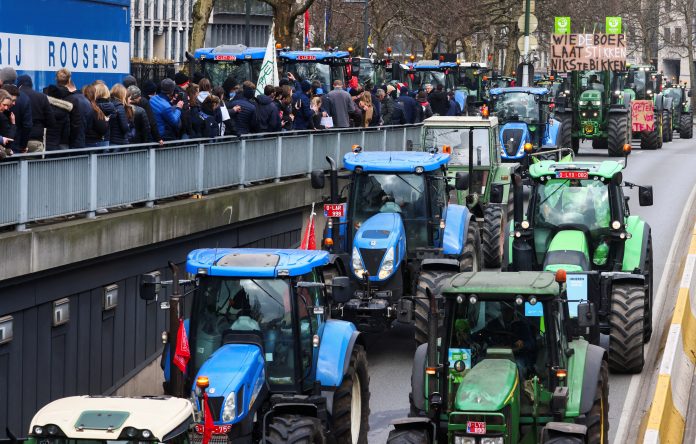Tyre tracks from huge tractors on industrial farms in western Belgium caught the attention of biomedical engineer Ineke Maes – AP News said.
Farmers have taken to the roads in recent weeks, blocking major cities and economic highways from Warsaw to Madrid and Athens to Brussels. The farmers demanded the cancellation of some of the world’s most progressive measures to combat climate change and protect biodiversity. They argue that these regulations are hurting their livelihoods and strangling them with bureaucracy.
The farmers’ protests have affected the daily lives of people across the 27-nation bloc and cost businesses tens of millions of euros in transport delays.
A sharp reaction from politicians has formed at national and EU level: they have pledged to reverse policies, some of which have been years in the making, on everything from pesticide use to limiting the amount of manure that can be spread on fields, for example.
Ineke Maes, who works in the umbrella group of the Belgian Federation for a Better Environment, comments on the situation as follows:
“In the environmental movement, we joke that we should get tractors ourselves to make a point. Then we would be competing fair and square. The purpose should be that we get negotiations, and that we get a deal through democratic process – the rules, you know,” she said. Reasoned arguments, she says, have been drowned out by the rumble of tractor engines.
The farmers plan to return on Monday and intend to be present when agriculture ministers discuss an emergency agenda item to simplify farm rules and reduce farm inspections, which environmentalists fear could lead to a further weakening of standards.
“That puts a bit more pressure on the ministers inside. So I would believe that ministers will be a bit more – insisting to have concrete results,” said a high-level EU official on the fact that the cries of disgruntled farmers can still be heard even in the furthest cabinets.
The environmental lobby and NGOs are distracted, realising that this is a serious threat. As a result, the EU’s flagship Green Deal programme, which aims at making the continent carbon neutral by 2050, is under threat.
“You really should not lose that long-term view, that vision of the future when you are working on policy,” said Maes. “You should not respond to the issues of the day by simply scrapping very important rules that have been seriously discussed, considered, that have been included in environmental impact reports and so on – and that have also been democratically approved in that way.”
EU Commission President Ursula von der Leyen insisted ahead of Monday’s meeting that she “remains fully committed to delivering solutions to ease the pressure currently felt by our hard-working farming women and men.” Von der Leyen’s Commission postponed an important pesticide proposal and allowed farmers to continue to use some land they should have left fallow to maintain biodiversity.
Ineke Maes fears that despite many factors, even the largest family farms in western Belgium, farmers are likely to stick to industrial methods that deplete the soil and pollute waterways.
“It is mind-boggling that this whole process is now grinding to a halt,” she stressed.
